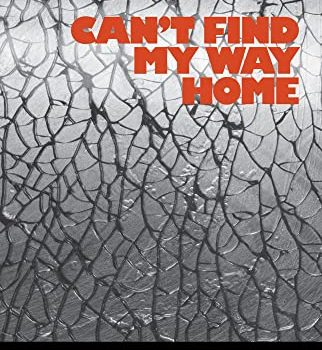Caren Gussoff Sumption Reviews Can’t Find My Way Home by Gwynne Garfinkle
 Can’t Find My Way Home, Gwynne Garfinkle (Aqueduct Press 978-1-61976-212-1, $20.00, 342pp, tp) January 2022.
Can’t Find My Way Home, Gwynne Garfinkle (Aqueduct Press 978-1-61976-212-1, $20.00, 342pp, tp) January 2022.
Two days shape young Joanna Bergman’s life: when she both got the lead role in her high school’s production of ‘‘Saint Joan’’ and began her friendship with the beautiful, popular Cynthia ‘‘Cyn’’ Foster, and when, three years later, Cyn dies in a botched protest bombing of a storefront Vietnam War draft board office. And, in Gwynne Garfinkle’s debut novel, Can’t Find My Way Home, no matter how many lives Joanna leads – and she lives several – it always comes down to those two days, and their indelible impact on her.
We meet Joanna first on the fateful school day, and follow her forward through time to the novel’s present day, in 1975 New York. Joanna has made a go of the actor’s life, with a regular role as a love interest on the popular daytime soap opera, Hope Springs Eternal. There’s drama on and off the set, as Joanna navigates backbiting from the other female stars and nurtures a real-life attraction to her on-screen lover, the handsome, older, philander, Martin Yates.
It’s hard enough for the inexperienced, naive Joanna to keep from being swept up by all this. But then Joanna starts seeing the ghost of Cyn.
At first, it’s surprising but understandable. Joanna harbors a tremendous amount of guilt over Cyn’s death; she was part of the protest planning, and was supposed to be there the night Cyn placed the improvised explosive at the draft board. Joanna came down with the flu at the last minute, and Cyn recklessly placed the bomb herself, and was blown up when the bomb accidentially detonates early.
But this is no ordinary haunting. Cyn’s ghost starts speaking and interacting with Joanna – and Cyn is very angry.
Cyn resents Joanna for being… alive. And so, for reasons not initially clear to Joanna – or us, the readers – Cyn pulls Joanna back to relive the night of the bombing, over and over again.
Each time, the night and its effects are a little different. Joanna makes other choices, new factors arise, and the timeline splits. And Joanna lives, literally, a different life, for a little while, at least, before she is thrust back into her current present, confused and disoriented.
These jumps are, indeed, confusing and disorienting. Garfinkle sets off most of these beta timelines as chapters, with their own corresponding date ranges, but it is as difficult for the reader to discern whether a jump is a memory or another lifetime as it is for Joanna. Transitions are without segue or explanation. Suddenly, Joanna is in another life, as Joanna: being sentenced for a bank robbery; living in Los Angeles with Cyn, under assumed names, as a radical feminist activist; as an English teacher, best friends with Cyn, who has Joanna’s role on the soap opera. In all cases, as abrupt and befuddling as each jump is, Joanna knows who, where, and when she is – though she doesn’t know how she knows, and she has vague memories of her actual (alpha) present and other timelines. It’s an impressive feat of craft on Garfinkle’s part that these sudden shifts are both uncomfortable and interesting to read. The only frustration is one we share with Joanna – we do not know what Cyn hopes to accomplish by pulling Joanna in and out of lives.
Cyn is frustrating. This reader has no idea whether Garfinkle intended for her to be thoroughly unlikeable, but she is. She’s fickle, cruel, and borderline abusive to Joanna, both in life and in death. As her friend, Cyn belittles Joanna constantly. She ridicules Joanna’s interest in theatre, she questions her dedication to anti-war causes, and even sleeps with Joanna’s boyfriends in front of her. We’re told, over and over, how much the two young women love and need one another, but there’s not much actual evidence in the prose. The weight of Joanna’s guilt does much of the work, keeping her bound to Cyn, after Cyn’s death, but the relationship is toxic. This reader wanted Joanna to figure out ghost Cyn’s goals, if only to see Joanna be free of her.
In the end, Joanna is able to unshackle herself to Cyn, in what amounts to a long-overdue confrontation.
It is also a testament to Garfinkl’e writing that it is never entirely clear whether Joanna is a reliable narrator. There is a moment where ghost Cyn ‘‘interferes’’ with Martin Yates at Joanna’s apartment, trying to prevent Joanna and Martin from becoming intimate – much as Cyn had done when alive with Joanna’s boyfriends. Martin dismisses it as a dream, and it’s ambiguous enough that it could have either happened or not. We, too, are never entirely sure if the gost of Cyn is a supernatural force or the projection of Joanna’s troubled psyche. But in the end, it doesn’t really matter. Joanna does find her way home.
Caren Gussoff Sumption is a writer, editor, Tarot reader, and reseller living outside Seattle, WA with her husband, the artist and data scientist, Chris Sumption, and their ridiculously spoiled cat-children.
Born in New York, she attended the University of Colorado, the School of the Art Institute of Chicago, Clarion West (as the Carl Brandon Society’s Octavia Butler scholar) and the Launchpad Astronomy Workshop. Caren is also a Hedgebrook alum (2010, 2016). She started writing fiction and teaching professionally in 2000, with the publication of her first novel, Homecoming.
Caren is a big, fat feminist killjoy of Jewish and Romany heritages. She loves serial commas, quadruple espressos, knitting, the new golden age of television, and over-analyzing things. Her turn offs include ear infections, black mold, and raisins in oatmeal cookies.
This review and more like it in the February 2022 issue of Locus.
 While you are here, please take a moment to support Locus with a one-time or recurring donation. We rely on reader donations to keep the magazine and site going, and would like to keep the site paywall free, but WE NEED YOUR FINANCIAL SUPPORT to continue quality coverage of the science fiction and fantasy field.
While you are here, please take a moment to support Locus with a one-time or recurring donation. We rely on reader donations to keep the magazine and site going, and would like to keep the site paywall free, but WE NEED YOUR FINANCIAL SUPPORT to continue quality coverage of the science fiction and fantasy field.
©Locus Magazine. Copyrighted material may not be republished without permission of LSFF.








